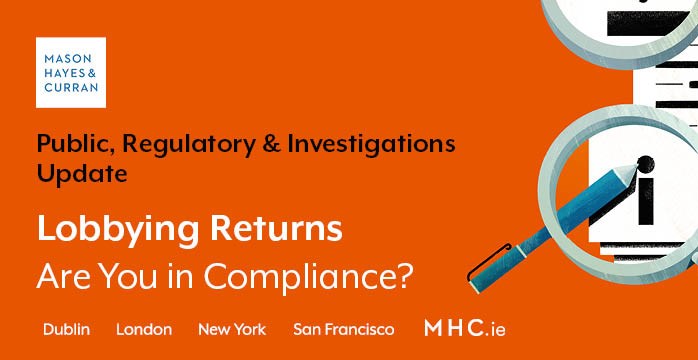
Employers, representative bodies, and advocacy groups all have legal obligations when involved in lobbying, including an obligation to file returns with the Standards in Public Office Commission. The consequences of breaching the legislation include fines and, potentially a term of imprisonment of up to two years for office holders, directors, managers and others involved in the running of your organisation. As the next return date looms, we consider the issues.
Lobbying is legal in Ireland, provided it is done in compliance with the Regulation of Lobbying Act 2015. The Standards in Public Office Commission (SIPO) is the body responsible for enforcing that Act. Breaches can result in fixed penalties and prosecutions leading to fines and a term of imprisonment of up to 2 years.
The consequences of a breach for directors, and other office holders or members of an organisation, are potentially very grave, as they may be found to be personally liable to criminal prosecution.
If you are engaged in relevant lobbying, you must:
- register as a lobbyist and
- provide a report detailing your lobbying activities three times a year, by a certain deadline.
The next deadline is 21 September 2020, for the period 1 May to 31 August 2020. In addition to the offence of failing to file a lobbying return on time, the Act creates offences for: knowingly providing false or misleading information to SIPO, obstructing an investigation, and lobbying without registering.
To find out if you are engaged in reportable lobbying, use the following three-part test:
Do any of the following describe you or your organisation?
- An employer with more than 10 employees where the communications are made on your behalf
- A representative body with at least one employee and the communication is made by a paid employee or officer of the body
- An advocacy group with at least one employee and the communication is made by a paid employee or officer of the body
- A third party being paid to communicate on behalf of any of the above
- A person communicating on the development or zoning of land.
Are you communicating with a Designated Public Official?
Certain classes of public official are identified in the Act as Designated Public Officials (DPOs) for the purpose of the regulation of lobbying - obvious examples include TDs, members of the Seanad and local authorities. Lists of DPOs can be found on the SIPO website and on the websites of public bodies who are obliged to publish the names of their DPOs. EU Commissioners are not DPOs. The European Commission, along with the European Parliament, operates its own separate, voluntary transparency register.
Any direct communication with a DPO may constitute a “relevant communication”, regardless of the method of communication used – more on this further below.
Does the communication involve a “relevant matter”?
“Relevant matters” are anything relating to:
- the initiation, development or modification of any public policy or of any public programme
- the preparation or amendment of an enactment or
- the award of any grant, loan or other financial support, contract or other agreement, or of any licence or other authorisation involving public funds
although there are some exemptions.
If you answered yes to one of the options under each part of the test, it is likely that you are required to register and make lobbying returns, unless one of the exemptions apply.
It is possible that some of the conversations at the recent controversial Oireachtas Golf Society dinner constituted lobbying for which a return must be made. It is important to note that the legislation does not make any distinction as to the venue or formality of a relevant communication. If a person within the scope of the legislation communicates with a DPO about a relevant matter, it counts as lobbying, regardless of the level of formality or the location of the conversation.
The first successful prosecution for failing to file a lobbying return by the relevant deadline resulted in a €1,250 fine for an Irish company in June 2019, and an order to pay the costs of the prosecution.
Comment
While lobbying is a vital part of the democratic process, a lack of understanding of the regulation of lobbying could result in organisations, and individuals, inadvertently incurring criminal liability under Irish law.
If you have any concerns surrounding your obligations in the area of lobbying, or if you are wondering whether you need to make a return before 21 September 2020, we in the Public, Regulatory and Investigations team are happy to help.
The content of this article is provided for information purposes only and does not constitute legal or other advice.






